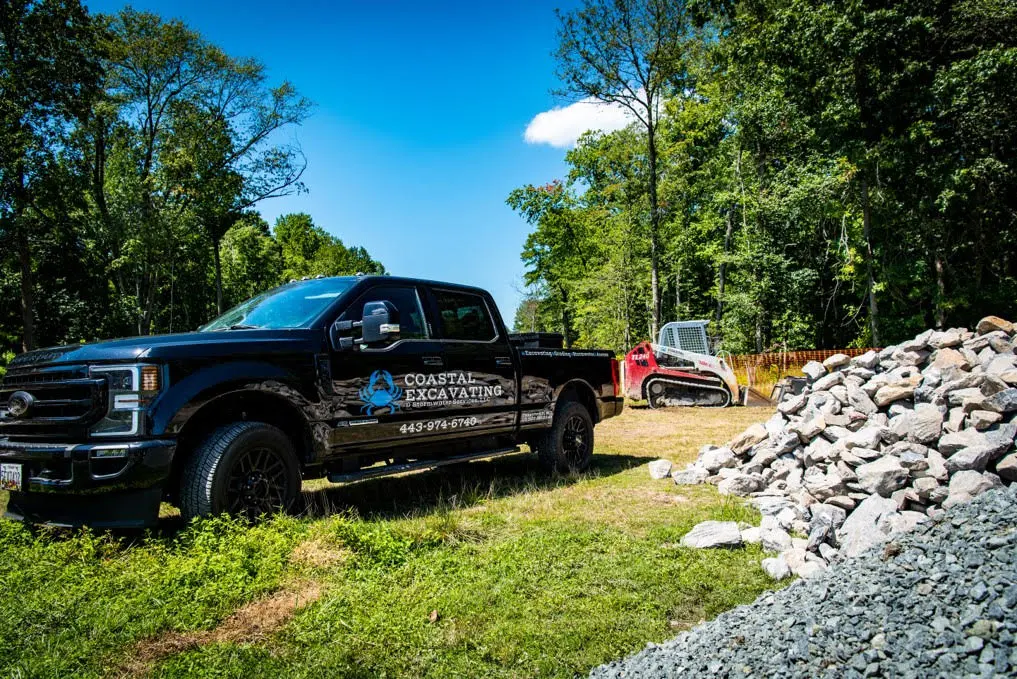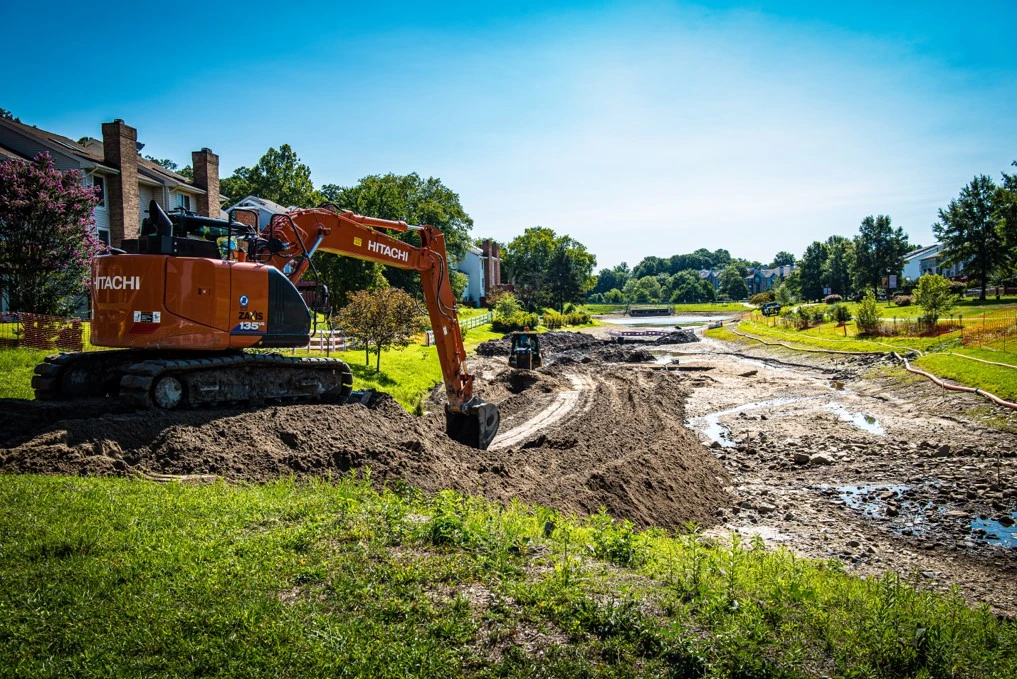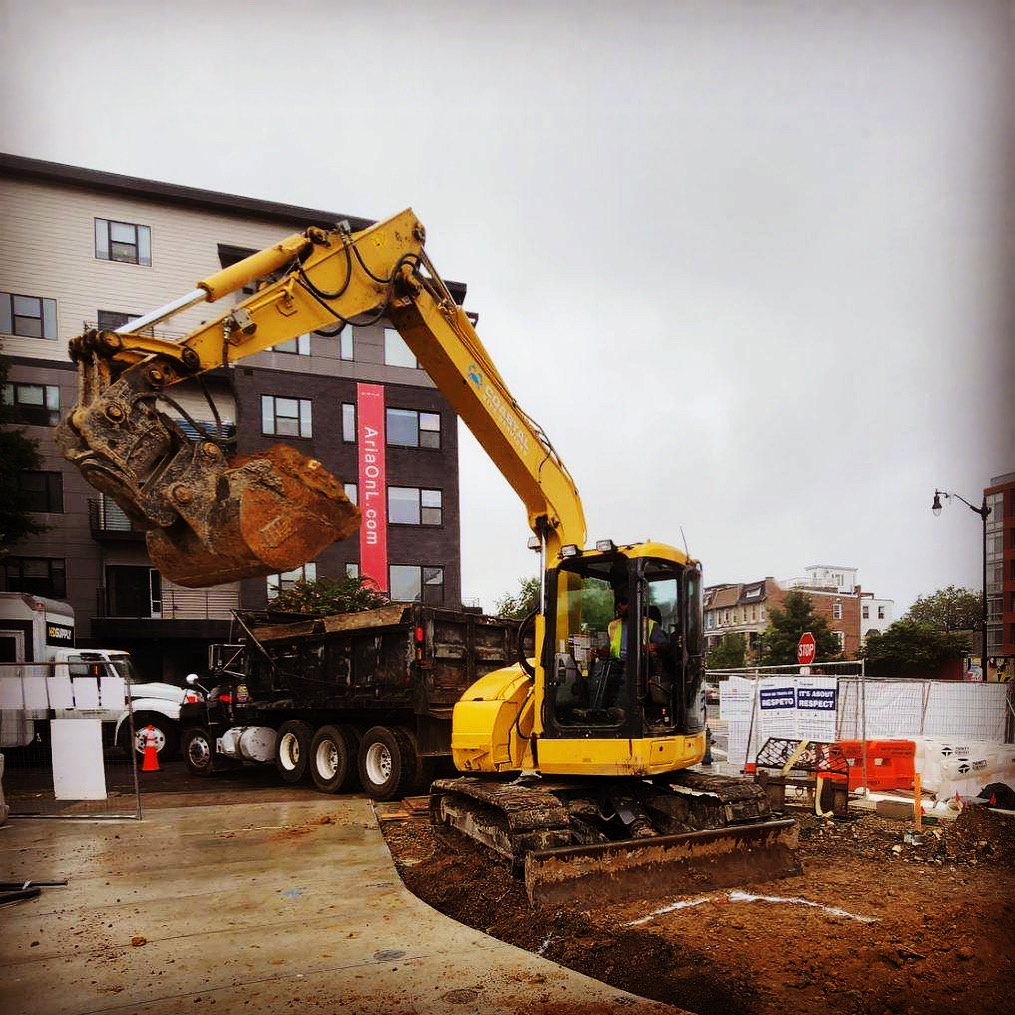EXCAVATION CONTRACTOR BLOG
Maryland Excavation Contractor: Trusted Experts In Excavation
Posted 7/12/2023 (Updated 8/21/2023)
In this blog post, we will delve into the crucial role that a Maryland excavation contractor plays in the construction and development industry. A good Maryland excavation contractor can make or break your project!
The construction and development industry is of great importance to MD for several reasons. Firstly, it contributes significantly to the state’s economy by generating jobs and business opportunities. The industry employs a large number of workers, including construction workers, architects, engineers, and project managers. This helps to stimulate economic growth and prosperity in the state.
Secondly, the construction and development industry plays a vital role in the infrastructural development of Maryland. It is responsible for constructing and maintaining various types of infrastructure, including buildings, roads, bridges, and utilities. These developments are essential for the state’s overall development and improving the quality of life for its residents.
Moreover, the industry supports other sectors like real estate, retail, and manufacturing. Construction projects often give rise to new commercial and residential spaces, attracting businesses and residents to the area. This leads to increased economic activity and investment, boosting the overall development of Maryland.
What We Will Tackle
Excavation services are an integral part of construction projects and serve several significant purposes. Firstly, excavations are necessary for the preparation of building foundations. By excavating the ground, construction teams can clear the area and prepare it for the construction of the foundation’s base.
Excavations also play a crucial role in the installation of utilities. Underground utility lines such as water, sewage, electricity, and gas need to be laid beneath the ground during construction. Excavations allow for the creation of trenches and tunnels to accommodate these utility lines.
Additionally, excavations are essential for site preparation and grading. Construction sites often need to be leveled or altered to suit the project’s requirements. Excavation equipment is used to clear and grade the land, ensuring it is suitable for construction activities.
Furthermore, excavations are crucial for the discovery and preservation of archaeological artifacts. Maryland has a rich history, and construction projects often come across historical artifacts and sites. Excavation teams work alongside archaeologists to excavate and document these findings, preserving the state’s heritage.
In summary, the construction and development industry significantly contributes to Maryland’s economy and infrastructure. Excavations play a pivotal role in construction projects by preparing sites, installing utilities, leveling land, and discovering historical artifacts. The industry’s importance and the significance of excavations highlight the essential role they play in driving the state’s development and preserving its heritage.
Role of Maryland Excavation Contractor
Excavation contractors are professionals who specialize in excavation work, which involves the removal or relocation of earth, rock, or other materials to create building foundations, trenches, or landscaping features. An excavation company plays a crucial role in various construction projects, including residential, commercial, and industrial.
The primary responsibility of a Maryland excavation contractor is to prepare the site for construction. They are skilled in operating heavy machinery, such as excavators, backhoes, and bulldozers, to dig trenches, clear land, and level surfaces. They may also use surveying and mapping equipment to ensure accurate measurements and proper grading.

Some of the specific tasks and responsibilities of excavation contractors include (FYI for more info, Check out one of our other posts that talks about Site Excavation Basics!)
1. Site Preparation: Excavating contractors assess the project requirements and prepare the construction site accordingly. This involves clearing vegetation, removing obstacles, and ensuring proper drainage.
2. Excavation and Digging: They perform excavation work, which includes digging trenches, basements, and foundations to the required depth, width, and shape. They must follow engineering or architectural plans accurately.
3. Earthworks: Maryland excavation contractor handle earthmoving tasks, such as filling or removing soil, rock, or other materials to create desired contours, slopes, or grades on the site.
4. Utility Installation: They may also be responsible for installing underground utilities, including water, sewer, gas, and electrical lines. This requires careful excavation to avoid damaging existing infrastructure.
5. Grading and Compacting: Excavation contractors are responsible for ensuring proper grading and compaction of soil to provide a stable base for construction. This includes using specialized equipment to compact soil layers and achieve the desired compaction rates. Learn more about why proper grading matters in this blog post!
6. Erosion Control: They implement erosion control measures to prevent soil erosion and sedimentation during and after excavation. This may involve installing erosion control blankets, silt fences, or retaining walls.
7. Site Cleanup: After completing the excavation work, contractors are responsible for cleaning the site and removing any debris or excess materials. This ensures a safe and tidy environment for construction activities.
8. Compliance and Safety: Excavation contractors must adhere to local building codes, safety regulations, and environmental guidelines. They should prioritize the safety of their crew, ensure proper equipment maintenance, and identify and mitigate potential hazards.
Overall, a Maryland excavation contractor play a crucial role in preparing construction sites and creating a solid foundation for various projects. They combine their knowledge, skills, and specialized equipment to execute excavation work efficiently and safely.
Collaboration with Other Construction Professionals
Here are some ways construction professionals collaborate with each other:
1. Coordination with architects and engineers: Construction professionals work closely with architects and engineers to ensure that the design and plans are feasible and meet the project requirements. They collaborate on issues such as structural integrity, building codes, and architectural details.
2. Communication with project managers: Construction professionals collaborate with project managers, who oversee the execution of the project. They provide updates on construction progress, discuss any issues or changes, and work together to find solutions to problems that arise during construction.
3. Communication with subcontractors & general contractors: Construction professionals often rely on subcontractors to perform specialized tasks or provide specific services. Effective communication is crucial to ensure that subcontractors understand the project requirements and complete their work on time and to the required quality standards.
4. Ensuring compliance with construction timeline: Construction professionals collaborate to ensure that the project is progressing according to the established timeline. They coordinate their activities, monitor progress, identify potential delays, and take necessary actions to keep the project on track.
5. Collaborative problem-solving: Throughout the construction process, construction professionals collaborate to identify and resolve issues that may arise. They share expertise, brainstorm solutions, and work together to overcome challenges and ensure the successful completion of the project.
Overall, effective collaboration among construction professionals is essential for a smooth and successful construction project. It allows for efficient project management, ensures compliance with design and timeline requirements, and facilitates problem-solving to overcome any obstacles that may arise.
Challenges and Solutions in Excavation Projects
Dealing with unpredictable environmental conditions, mitigating site-specific challenges and obstacles, Adopting innovative technologies and methods Dealing with unpredictable environmental conditions: It is important to conduct thorough environmental assessments and studies before beginning any construction or development project. This will help identify potential risks and challenges that may arise due to unpredictable environmental conditions.

Additionally, implementing flexible design and construction approaches can help mitigate potential damages caused by these conditions. For example, using modular or prefabricated construction methods can allow for quicker and easier repairs or modifications in case of unexpected environmental events.
Mitigating site-specific challenges and obstacles
Each construction site development project comes with its own set of challenges and obstacles that need to be addressed. To mitigate these challenges, it is crucial to conduct a detailed site analysis in order to understand the specific conditions and constraints of the site. This can include analyzing the topography, soil conditions, water drainage patterns, and existing infrastructure.
By understanding these site-specific challenges, appropriate engineering and design solutions can be implemented to overcome them. This may involve using specialized construction techniques, such as slope stability measures for hilly terrains or foundation design approaches for poor soil conditions.
Adopting innovative technologies and methods
To effectively deal with environmental conditions and site-specific challenges, adopting innovative technologies and methods can prove valuable. This can involve using advanced materials and construction techniques that are more resistant to environmental impacts or utilizing new technologies for efficient project management and monitoring.
For example, utilizing building information modeling (BIM) can help optimize project planning and design, while also enhancing communication and collaboration between different stakeholders. Additionally, implementing sustainable design principles and incorporating renewable energy solutions can also help mitigate environmental impacts and improve the overall resilience of the project.

Conclusion – Maryland Excavation Contractor
In conclusion, excavation contractors play a crucial role in Maryland’s construction and development industry. Their expertise and skills in digging, leveling, and preparing construction sites are vital for successful project completion. Without their contribution, the construction and development sector would face significant obstacles and delays. A great excavation company can help make your storm water management, earth moving or any MD excavation project you might have go smoothly.
Excavation contractors are responsible for a range of tasks, including land clearing, excavation, grading, and trenching. They ensure that the site is properly prepared and ready for construction, which is essential for the safety and stability of any structure. Their expertise in using heavy machinery and ensuring proper soil compaction helps to prevent future issues such as foundation problems and drainage issues.
Moreover, excavation contractors also contribute to the overall economic growth of Maryland. By efficiently completing excavation projects, they enable other construction professionals to carry out their work, leading to the completion of buildings, roads, and infrastructure projects. This, in turn, drives economic development, creates jobs, and improves the overall quality of life in the state.
Therefore, it is important to acknowledge the significant contributions made by excavation contractors in Maryland. Their skills, knowledge, and dedication have played a key role in the success and growth of the construction and development industry in the state. Without their expertise, many construction projects would not be possible, and the state’s economy and infrastructure would suffer as a result.
Frequently Asked Questions (FAQs)
What is an LLC?
An LLC, which stands for Limited Liability Company, is a legal structure that provides limited liability protection to its owners while allowing them to enjoy certain tax benefits. It combines the flexibility of a partnership with the liability protection of a corporation.
What is concrete demolition?
Concrete demolition is the process of breaking down concrete structures or removing concrete elements from a site. It may involve the use of heavy machinery or specialized tools to break the concrete down into smaller pieces for disposal or recycling. Check out more about our demolition services here.
How can I request a quote?
To request a quote, you can reach out to a company or service provider either through their website or by phone. Provide them with the necessary details and specifications of the work or product you require, and they will provide you with an estimated cost based on your requirements.
What licenses are necessary for a Maryland excavation?
Operating an excavation business in Maryland requires obtaining the necessary licenses and permits. To determine the exact licenses needed for a Maryland excavation LLC, it is recommended to check with the Maryland Department of Labor, Licensing and Regulation (DLLR) or consult a legal professional who specializes in business licensing.
How is the price for services determined?
The price for services can vary depending on several factors, such as the scope of work, complexity, location, and market rates. It is best to contact the service provider or contractor directly to discuss your specific needs and obtain a detailed quote.
Can you please provide information about your location?
Our company is located in Baltimore, Maryland. We operate within the Baltimore region and provide our services to residential and commercial clients in the surrounding areas.
What should I do if I have a complaint?
If you have a complaint or encounter any issues with our services, please reach out to us directly. We value our customers’ satisfaction and will make every effort to address and resolve any concerns you may have in a timely and fair manner.
